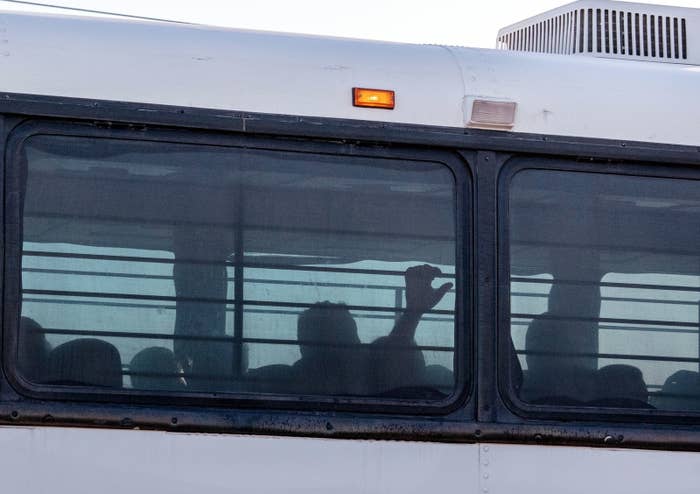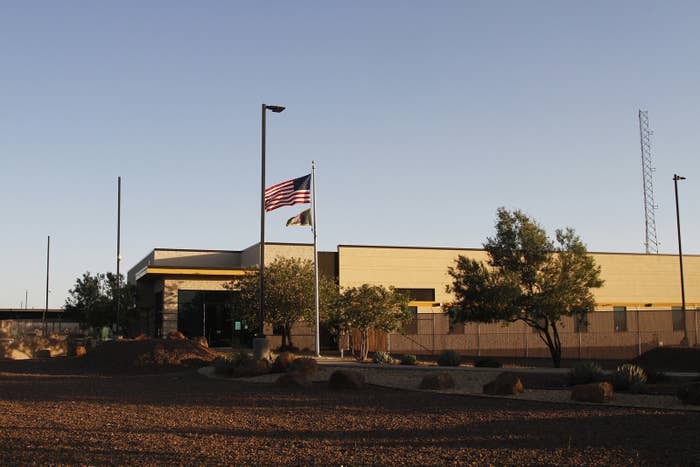
Hundreds of immigrant children are being moved out of a filthy and overcrowded Border Patrol station in Texas following reports they were detained for weeks in unsanitary conditions without enough food or water.
The children were removed after attorneys who visited the Clint, Texas, facility last week described children caring for infants and toddlers, a lack of access to soap and toothbrushes, and inadequate food, water, and sanitation. The attorneys said 15 children were sick with the flu and another 10 were in quarantine.
In one case, a toddler who had wet his pants and had no diaper was being cared for by immigrant girls.
“A Border Patrol agent came in our room with a 2-year-old boy and asked us, ‘Who wants to take care of this little boy?,’" one girl reportedly told the attorneys. "Another girl said she would take care of him, but she lost interest after a few hours and so I started taking care of him yesterday."
The accounts provided a rare glimpse inside the facilities that remain closed off to the public and come amid a series of reports of immigrant children and adults being held in squalid conditions for days and even weeks.
The Department of Health and Human Services said 249 unaccompanied children detained at the Clint facility would be moved to shelters operated by the Office of Refugee Resettlement by Tuesday. Texas Rep. Veronica Escobar said that as of Monday morning only 30 children remained at the Border Patrol station. Another unspecified number of kids were being transported to a temporary tent facility in El Paso.

One of the attorneys who visited the Clint facility said the bleak conditions the children were held in prompted lawyers to speak out.
"I have never seen such appalling, degrading, inhumane circumstances in my 12 years representing children and families in immigration detention," Elora Mukherjee, the director of the Immigrants' Rights Clinic at Columbia Law School, told BuzzFeed News. "It's an urgent public health crisis and it's a humanitarian crisis."
The Border Patrol station has a capacity of slightly more than 100 people, Mukherjee said, but when attorneys visited the facility last week there were approximately 350 children inside. Some children had been detained for more than three weeks at the station, and in some cases it wasn't the first Customs and Border Protection facility they had been held in.
Under the Trafficking Victims Protections Reauthorization Act of 2008 Border Patrol is not allowed to hold children for longer than 72 hours.
The attorneys were visiting the facility as part of the 1997 Flores court settlement agreement that gives lawyers for the plaintiffs the right to inspect facilities holding immigrant children. The lead counsel on the case invited attorneys from across the US to visit the facilities and interview children.
While the US government has identified the majority of the children as unaccompanied minors, Mukherjee said many at the Clint station had crossed the border with an adult family member that was either a parent, sibling, grandparent, or other relative.
Family members like grandparents who are not legal guardians can be separated from children by US border agents. It's unknown why some of the parents were separated from children in the Clint facility. The Houston Chronicle reported that more than 700 children were taken from their parents or, in a few cases, from other relatives between June 2018 (when President Trump signed at executive order to end the "zero tolerance" policy that resulted in the systemic separation of families at the border) and May 2019.
"We need to investigate CBP detention conditions across the border," Mukherjee said. "This should not be happening on American soil, we need Congressional hearings to immediately investigate and demand information."
